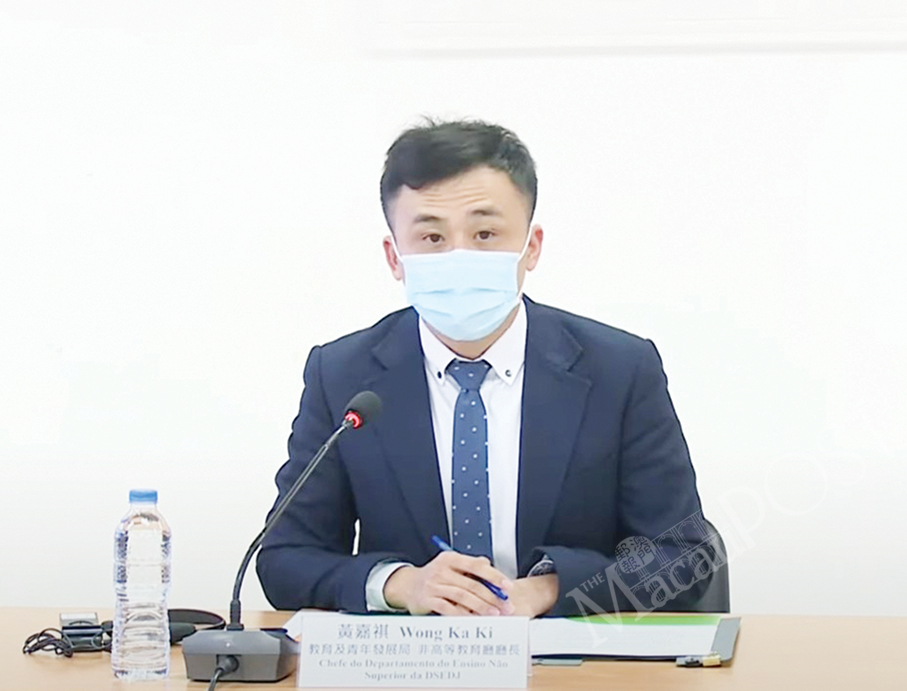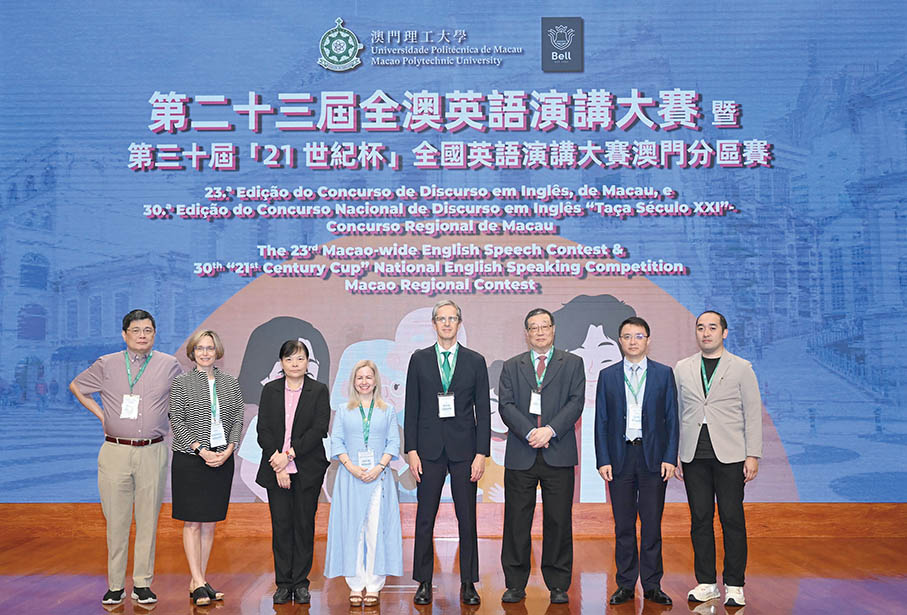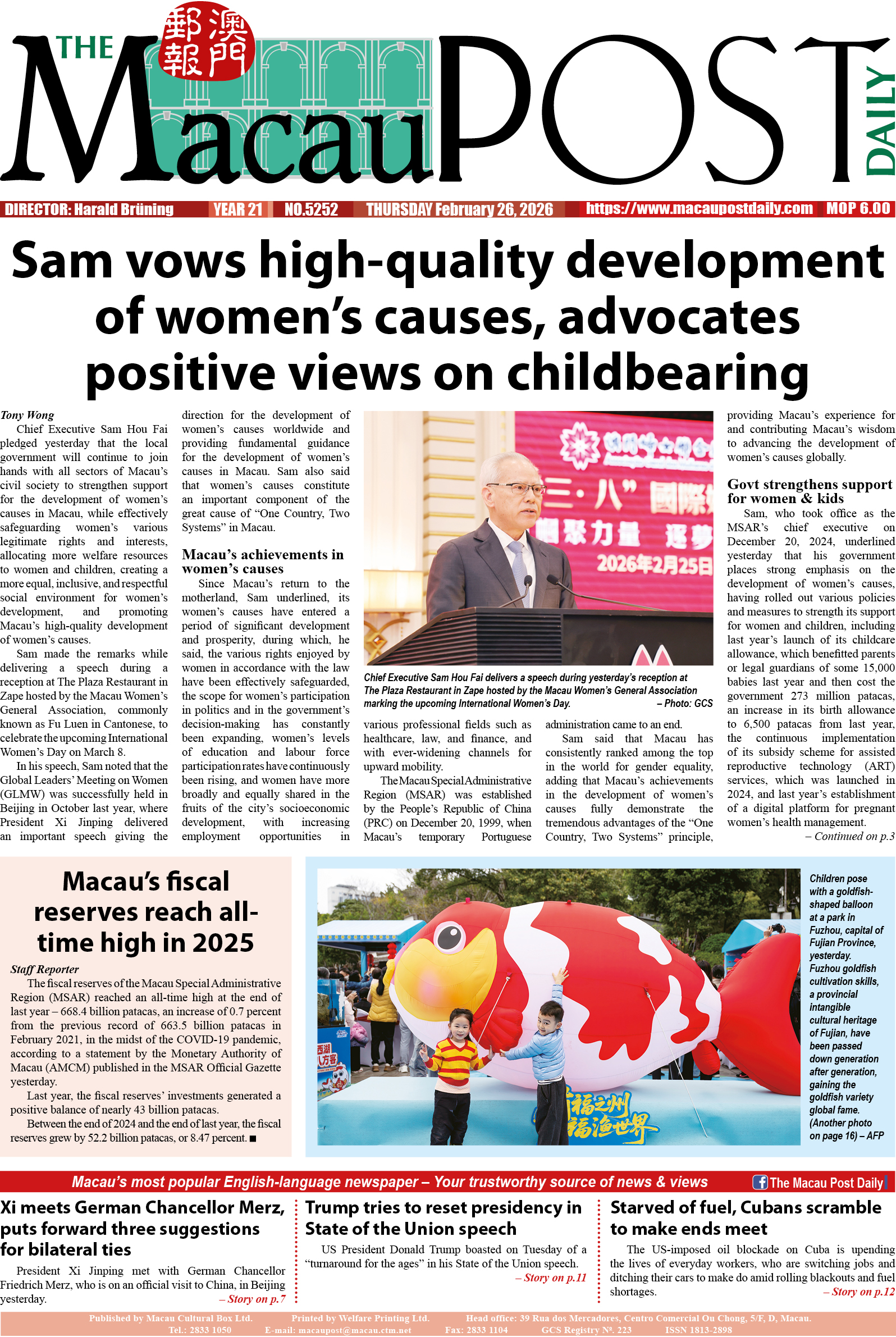The Macau government announced late last night that its current 15-day ban on all passenger flights from foreign countries, which is slated to end at 23:59 p.m. on Sunday, will not be extended, meaning that it will be lifted on Monday.
The Novel Coronavirus Response and Coordination Centre made the announcement in a statement, which said that from 00:00 on Monday “civil aircraft transporting passengers will be allowed to fly to Macau from any regions outside China”.
According to the one-China policy, “China” comprises the mainland, Macau, Hong Kong and Taiwan.
The Macau government imposed the blanket ban on all passenger flights from foreign countries on Sunday last week, with the aim of reducing the potential risk of the novel coronavirus to the city’s public health.
Consequently, Macau’s airport is currently only running regular passenger flights with cities in the mainland and Taipei.
Before the 15-day ban which started on January 9, Macau had only one international regular passenger flight – Singapore – during the COVID-19 pandemic.
Last night’s statement noted that after the lifting of the ban on Monday next week, those flying to Macau from foreign countries will continue to be subject to the Macau government’s particularly strict COVID-19 control and prevention measures for them, which were implemented on January 6.
Last night’s statement noted that before boarding either a direct flight to Macau or the first leg of a connecting flight to the city, according to the measures that started on January 6 and will resume on Monday, those from any of 22 “extremely high-risk” countries will have to present a nucleic acid test (NAT) certificate confirming negative COVID-19 results of three consecutive tests carried out within five days prior to their intended departure en route to Macau, and the three tests must each be carried out at least 24 hours apart.
The 22 “extremely high-risk” COVID-19 countries comprise Bangladesh, Botswana, Brazil, Cambodia, Eswatini, India, Indonesia, Iran, Lesotho, Malawi, Mozambique, Namibia, Nepal, Pakistan, the Philippines, Russia, South Africa, Sri Lanka, Tanzania, Turkey, the United States, and Zimbabwe.
The statement noted that those arriving in Macau from any of the 22 countries will have to undergo 28 days of hotel quarantine.
Last night’s statement noted that those travelling from other foreign countries will have to present an NAT certificate confirming a negative COVID-19 result valid for 48 hours prior to boarding their flight. Upon arrival in Macau, they will have to undergo 21 days of hotel quarantine.
Last night’s statement also noted that those aged 12 or over departing for Macau from any foreign country will have to present a certificate confirming that they have been fully vaccinated against COVID-19 at least 14 days prior, or a doctor’s certificate confirming that they are unable to be inoculated against the novel coronavirus. Their last required shot of a novel coronavirus vaccine must have been administered within seven months prior to boarding their flight, the statement noted.
Classes suspended for all cross-border students, until after CNY
Meanwhile, addressing yesterday’s regular press conference about Macau’s novel coronavirus situation, Wong Ka Ki, who heads the Non-Tertiary Education Department of the Education and Youth Development Bureau (DSEDJ), announced that the government has decided to implement class suspensions for all cross-border students and teachers enrolled in local schools or higher education institutions, which take effect today, with the aim of reducing the potential COVID-19 risk to Macau amid the current Omicron wave in the neighbouring city of Zhuhai.
According to Wong, the cross-border students and teachers can only return to Macau for classes after the Chinese New Year (CNY) holiday period.
The upcoming Chinese New Year of the Tiger falls on February 1.
The validity of the negative nucleic acid test (NAT) result for those entering Macau from Zhuhai has been shortened to just 24 hours, which took effect on Sunday, in the wake of the current COVID-19 outbreak in the neighbouring city, which started last week.
As of last night, Zhuhai had reported a total of 29 COVID-19 positive cases, including three asymptomatic cases, during its current Omicron wave.
Thousands of students and teachers enrolled in schools or higher education institutions in Macau live in Zhuhai or Zhongshan.
Since the first detection of new COVID-19 positive cases on Friday last week, the Macau government has suspended classes for cross-border students and teachers who live in areas and neighbourhoods affected by COVID-19 in Zhuhai or Zhongshan. However, cross-border students and teachers living in other areas not affected by COVID-19 in Zhuhai or Zhongshan had been allowed to attend to school – before today, but, like all other travellers, they had had to present an NAT certificate confirming a negative COVID-19 result valid for 24 hours when crossing the Macau-Zhuhai border.
During yesterday’s press conference, Wong noted that more neighbourhoods in Zhuhai have become subject to its government’s COVID-19 control and restriction measures. With the aim of fully complying with COVID-19 measures taken by both Zhuhai and Macau governments, Wong said, his bureau has concluded that “further reducing travel by students and teachers between the two cities will be favourable to reducing the COVID-19 risk to Macau”, after consulting the Macau Health Bureau (SSM).
Consequently, Wong said, his bureau has decided to suspend classes for all cross-border students and teachers from today until the end of the Chinese New Year holiday period.
Wong also said that mid-term final examinations will be completed within this week in around 80 percent of local schools so they will be able to start their CNY holiday earlier than initially scheduled, because of which, Wong said, his bureau has concluded that class suspensions for all cross-border students would not cause any major impact on the education sector.
According to Wong, the remaining 20 percent of local schools where mid-term examinations are still ongoing can decide whether to continue their exams next week, or to start their CNY holiday earlier and therefore postpone their exams.
Wong also noted that currently local higher education institutions are not holding their mid-term examinations, and they will start their CNY holiday early next week.
Stricter jab-or-test measure
Meanwhile, the Health Bureau has amended its guidelines on COVID-19 vaccinations and nucleic acid testing (NAT) for “all staff members” in the city – the so-called jab-or-test measure – earlier this month. According to the amended version, which will take effect on February 21, almost the entire working population in the city, regardless of whether working in the public or the private sectors, will have to be tested for COVID-19 once every week, or even more frequently, if they have not been fully (twice) inoculated against the novel coronavirus at least 14 days prior.
The measure will cover almost the entire working population as it will apply to, according to the guidelines, all those in contact with service users during their work, or all those who work with their colleagues in indoor workplaces.
According to the original version of the guidelines, which was published in September last year and is still in force, staff members are required to be tested for COVID-19 once every week, or even more frequently, if they have not been inoculated against the novel coronavirus – i.e., having not received at least one COVID-19 jab.
The new version of the vaccination-or-test measure will start for the education sector and all those working in social service facilities on February 21, the Education and Youth Development Bureau (DSEDJ) and the Social Welfare Bureau (IAS) announced in statements yesterday. The current version of the jab-or-test measure got off the ground in the two sectors in October last year.
The jab-or-test measure for the education sector applies to higher education students, teachers and all other staff members, as well as non-tertiary education teachers and all other staff members.

Wong Ka Ki, who heads the Education and Youth Development Bureau’s (DSEDJ) Non-Tertiary Education Department, addresses yesterday’s press conference about the city’s COVID-19 situation. Photo: GCS









